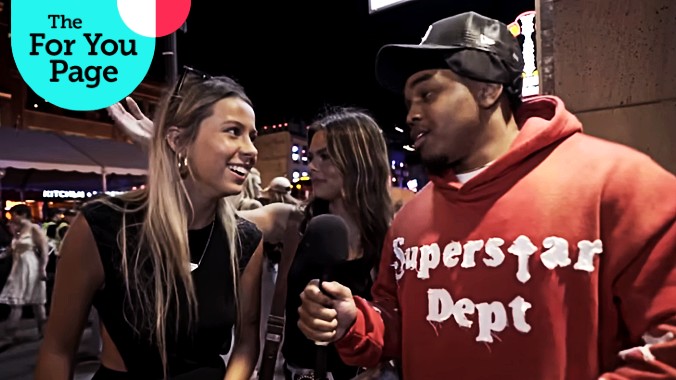When Your Viral Moment Comes, Will You Be Goldfish Guy or Hawk Tuah Girl?
A few weeks ago, my husband told me that a clip of our wedding vows appeared on his cousin’s For You Page and had already racked up nearly 600,000 views. I was immediately tense.
Screenshot: Tim & Dee TV/ Youtube Entertainment
The For You Page is a bi-monthly column by Alise Morales that explores, inspects, traverses, sifts through, and dives into internet culture.
It’s been just over a month since the world was first introduced to Hailey Welch–better known as Hawk Tuah Girl–via a viral video posted by the man-on-the-street interview team Tim and Dee TV. In the 12-second clip outside a bar in Nashville, Welch is asked the age-old question: “What’s the one move in bed that makes a man go crazy?” She jokingly responds with a Southern twang, “Oh you gotta give ‘em that hawk-tuah and spit on that ‘thang.” And thus a mega-meme was born.
But as I watched this viral moment unfold, I couldn’t help but feel uneasy about my own recent experience with unintended virality. Welch, who was working in a “spring factory” at the time the video was filmed (yes–springs like you would find in an old mattress), has since signed with a manager who is already touting “endless” opportunities for their viral client. As of June 26, she’d sold $65,000 in “HAWK TUAH ‘24 SPIT ON THAT THANG” emblazoned hats, according to Rolling Stone. She’s been featured on podcasts, been meme’d on every platform imaginable, and invited onstage at a Zach Bryan concert. As far as spitting-on-a-dick-related virality goes, things appear to be going pretty well for Welch. And that’s good! It’s ultimately a funny, charming, harmless video and she deserves to make a buck off it if she can.
I think Welch got pretty lucky. But what is a person supposed to do when they’re going viral with a video that is entirely out of their own hands, and they don’t end up so lucky?
A few weeks ago, I was dicking around on my phone when my husband told me that a video of our wedding vows, posted by our wedding videographer almost three years after the fact, appeared on his cousin’s For You Page and had already racked up nearly 600,000 views. He was excited, but I was immediately tense.
@toastweddings “Till death do us part” 🫨🤯😆 #weddingvows #weddingceremony #weddingday #groom #weddingvideo #fypage ♬ original sound – TOAST WEDDINGS
-

-

-

-

-

-

-

-

-

-

-

-

-

-

-

-

-

-

-

-

-

-

-

-

-

-

-

-

-

-

-

-

-

-

-

-

-

-

-

-








































